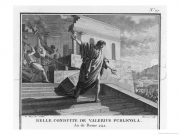The rationale for what is now called “originalism” has chiefly to do with the legitimacy of the 1787 Constitution.
Time to Demote the Separation of Powers?
I’ve just finished F.H. Buckley’s excellent new book The Once and Future King. I’m reviewing the book for another outlet so I won’t repeat myself here, but here’s the short version: Professor Buckley has identified a key weakness in the American system of government, but perhaps has misidentified its roots. Regardless, I think that his book is very important for thinking about a way out of our present gridlock and dysfunction.
Here I would like to take up and challenge one of the most controversial parts of Buckley’s argument. Buckley argues that the Framers established a political system of congressional dominance at the Constitutional Convention, and that separation of powers was something that emerged later in American history, contrary to their wishes. Quoting Buckley’s words on this site, he argues that “separation of powers…should be demoted as the touchstone of the Constitution, that a fear of executive power better explains what motivated the delegates.” Or, to quote from his book:
“What [the Framers] had in mind was a different form of government than our present one, with a weaker separation of powers between the legislative and executive branches and with very different ideas about presidential elections….[T]he delegates very nearly adopted a system not unlike the parliamentary regimes of Great Britain and Canada.”
As much as I admire the overall thesis of the book, I am less convinced regarding this point. Buckley is correct that the Virginia Plan, which was written by Madison, called for election of the upper house of the legislature by the lower house, and for the legislature to elect the President. This plan certainly would have established something similar to a parliamentary system, and not a separation of powers system. Madison’s authorship of the VA Plan (and his dissatisfaction with some aspects of the Convention’s work) leads Buckley to conclude that “he did not have a thick conception of executive power or of a separation of powers in which the president might routinely oppose the will of Congress.”
However, Madison’s views on executive power were nebulous during the early stages of the Convention, clearly by the end of the Convention he came to view an independent executive as one of the chief means by which a tyrannical and unchecked legislature could be avoided. While it certainly took the Convention a lot of effort to identify a practical alternative to having the legislature select the President, the fact that they worked so assiduously for an alternative shows how reluctant they were to make the executive dependent on the legislature.
A different (and, I would argue, more compelling) interpretation of the Framers’ views on executive power has been advanced by various scholars over the years (my favorite recent source is Forrest McDonald). That interpretation states that from independence to the late 1780s, there was immense confidence in the unchecked authority of legislative power and extraordinary fear of executive power. This produced disastrous consequences, and by the time of the Convention most delegates understood the need for an independent executive, even if they hadn’t yet determined how it should be established. Through their deliberations a consensus emerged, at least among those who supported and ratified the Constitution, that the separation of powers and an independent executive were important constitutional principles. The Federalist reflects this consensus.
I reiterate that I don’t think Buckley’s argument hinges on this interpretation of the Convention, so independent of this objection his basic thesis is still right and very important. But while he is right about its defects, he gives the separation of powers too little credit (as Ilya Somin has also argued, over at the Volokh Conspiracy), both in terms of its ability to preserve liberty and in terms of the Framers’ dedication to that concept.
The key is figuring out a way to preserve the benefits of the separation of powers while reducing its disadvantages. The Framers’ eventual solution to that problem (which came well after ratification) was the development of political parties that would coordinate legislative and executive action, giving voice to the broader concerns of a national majority.


